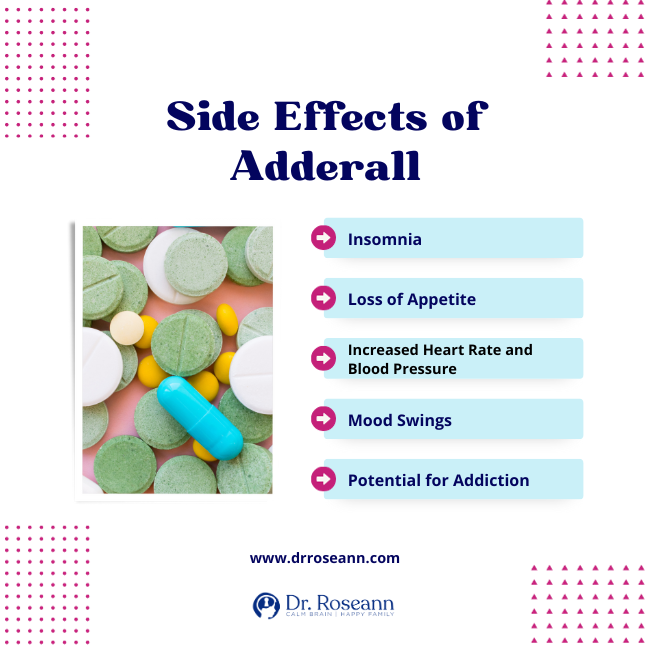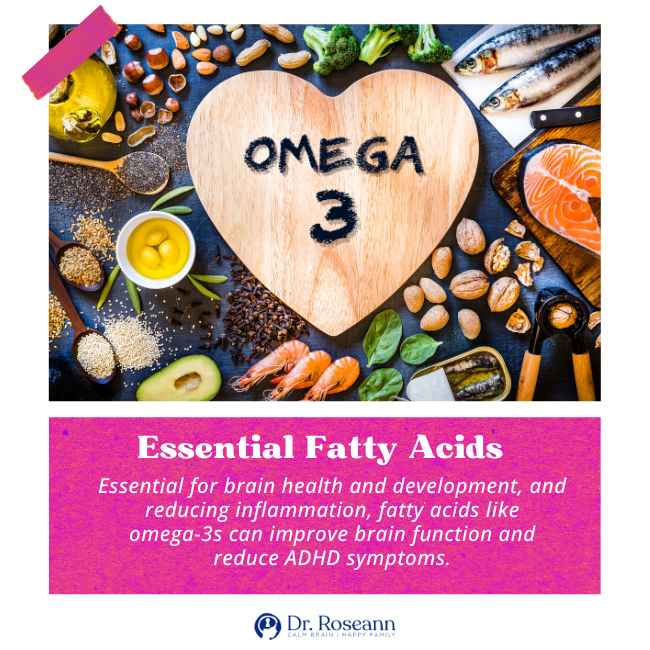Attention-Deficit Hyperactivity Disorder, or ADHD, is a medical condition that affects millions of individuals in the United States. ADHD is characterized by decreased attention span, increased distractibility, and hyperactivity. The traditional treatment for ADHD is prescription medication, particularly stimulants such as Adderall, which boost dopamine levels in the central nervous system, leading to enhanced alertness, focus, and productivity.
However, prescription medications come with potential side effects, including insomnia, loss of appetite, and even addiction. As a result, many parents of children with ADHD are exploring science-backed natural solutions for treatment.
Why Such a Need for Alternatives to Adderall
ADHD is a prevalent condition that causes dysregulation of the brain and behavior. Traditional ADHD treatment is prescription medications like Adderall. However, there's a growing concern among individuals and parents about the potential side effects associated with these medications, paving the way for a keen interest in natural and holistic alternatives.
Understanding the Side Effects of Adderall

Adderall, a stimulant medication, works by increasing the levels of neurotransmitters in the brain, thereby improving focus and reducing impulsivity. However, while effective, it can lead to a range of side effects that can be concerning. Some common side effects include:
- Insomnia: The stimulant nature of Adderall can interfere with sleep patterns, leading to difficulty falling asleep or staying asleep.
- Loss of Appetite: Individuals on Adderall might experience a reduced desire to eat, which can be problematic, especially for growing children.
- Increased Heart Rate and Blood Pressure: As a stimulant, Adderall can cause elevations in heart rate and blood pressure, posing risks to individuals with pre-existing heart conditions.
- Mood Swings: Some people may experience mood swings, anxiety, or even depression as a result of taking Adderall.Potential for Addiction: There's also the risk of dependency or addiction, given that Adderall is a substance with potential for misuse.
Given these and other potential side effects, many are seeking alternatives to Adderall that may offer symptom relief with fewer risks.
Natural Alternatives to Adderall
1. Magnesium Supplements:
Magnesium is a vital nutrient essential for healthy brain functions such as memory, attention, and mood regulation. By supplementing magnesium, ADHD symptoms such as hyperactivity and impulsivity can be reduced. It's advisable to consult with a healthcare provider to determine the correct dosage.
2. Methionine:
Methionine is an amino acid playing a crucial role in cognitive function and is a precursor to the neurotransmitters dopamine and norepinephrine, which can help improve mood and boost energy levels. It is also involved in the synthesis of other important amino acids and neurotransmitters.
3. Citicoline:
Citicoline enhances cognitive performance by improving focus, memory, and attention. It also improves cerebral blood flow and protects brain cells against oxidative stress. Citicoline is believed to increase the production of important neurotransmitters, including acetylcholine.
4. Mineral Supplements:
Minerals such as zinc, iron, calcium, and selenium play a role in cognitive development and can help improve ADHD symptoms. A balanced intake of essential minerals is crucial for brain health.
5. Vitamin B-6
Vitamin B-6 can aid in increasing dopamine levels, which may improve attention and focus in individuals managing ADHD symptoms.
6. Vitamin B-12:
Vitamin B-12 can play a role in reducing cognitive decline and increasing energy levels, supporting overall brain health.
7. GABA:
GABA supplements can promote relaxation and help with sleep, which can be beneficial for individuals with ADHD.
8. Ginkgo Biloba:
Ginkgo Biloba may enhance cognitive function and attention in individuals with ADHD by promoting blood flow in the brain and acting as an antioxidant.
9. Alpha GPC:
Alpha GPC, by supporting the production of the neurotransmitter acetylcholine, holds promise for improving cognitive function and attention, especially in individuals with ADHD.
10. Lion's Mane:
Lion’s Mane can improve cognitive abilities, reduce inflammation, promote brain cell growth, and support the immune system.
11. Pycnogenol:
This antioxidant can improve cognitive function and reduce oxidative stress, with clinical trials showing its benefits for ADHD symptoms.
12. Essential Fatty Acids:
Essential for brain health and development, and reducing inflammation, fatty acids like omega-3s can improve brain function and reduce ADHD symptoms.

13. Probiotics:
Improving gut health and reducing inflammation through probiotics can have a positive impact on brain function, thanks to the gut-brain axis.
14. Caffeine:
As a natural stimulant, caffeine can promote focus and mental energy, but moderation is crucial, especially in children and teenagers.
15. Lifestyle Changes:
Incorporating stress management techniques like mindfulness meditation, ensuring enough sleep, and regular exercise can significantly improve ADHD symptoms.
16. Anti-Inflammatory Diet:
An anti-inflammatory diet, rich in whole foods and omega-3 fatty acids, may help alleviate ADHD symptoms by reducing inflammation and supporting brain health.
17. Intermittent Fasting:
Intermittent fasting can help regulate blood sugar levels and improve brain function, potentially benefiting individuals with ADHD.
18. Aerobic Exercise:
Regular aerobic exercise can enhance brain health, improve mood, and help manage symptoms of ADHD by promoting better focus and reducing anxiety.
19. Neurofeedback:
Neurofeedback is a technique that trains individuals to alter their brain waves, which can lead to improved focus and reduced symptoms of ADHD over time.
20. CALM PEMF™:
CALM PEMF™ utilizes low-frequency electromagnetic pulses to enhance brain functions such as memory, focus, and concentration, offering a non-invasive approach to managing ADHD symptoms.
21. Sensory Exercises:
Engaging in sensory exercises like deep breathing, meditation, and yoga can help individuals with ADHD manage stress and improve their focus and attention span.
Understanding Natural Stimulants
Natural stimulants are substances derived from natural sources such as plants that have stimulating effects on the brain and body. They differ from synthetic stimulants like Adderall, which are chemically manufactured.
Natural stimulants often have a long history of traditional use and are typically perceived as being gentler and having fewer side effects compared to their synthetic counterparts.
The Contrast with Synthetic Stimulants
Synthetic stimulants like Adderall are specifically formulated to treat conditions like ADHD by increasing neurotransmitter activity in the brain. Although they are supposed to increase alertness, synthetic stimulants can come with a host of potential side effects including insomnia, anxiety, increased heart rate, and even addiction.
On the other hand, natural stimulants like caffeine can also help improve attention and focus, albeit usually to a lesser degree. The advantage lies in the typically mild side effect profile of natural stimulants. However, the efficacy and safety of natural stimulants can vary widely, and the same cautions regarding dosage and potential side effects should be considered.
Potential Benefits Without Harsh Side Effects
The potential benefits of natural stimulants like caffeine in improving attention and focus come with the advantage of avoiding the harsher side effects often associated with synthetic stimulants.
This makes natural stimulants an attractive alternative for individuals looking for a more gentle approach to managing ADHD symptoms or improving cognitive performance. However, it's crucial to approach natural stimulants with an informed perspective, understanding their limitations and ensuring appropriate dosages to avoid adverse effects.
Natural Alternative to Adderall for Studying: Magnesium and Vitamin B-12
In the quest for enhanced focus and cognitive performance, especially in the context of studying, many individuals look for alternatives to stimulant medications like Adderall. Two natural supplements that have garnered attention in this regard are Magnesium and Vitamin B-12. Both these nutrients play pivotal roles in brain health and cognitive function, making them a potential natural alternative to Adderall for those looking to improve their studying capabilities.
Magnesium:
Magnesium is a crucial mineral that supports a vast range of bodily functions, including nerve and muscle function, bone health, and importantly, brain health. In the brain, magnesium helps regulate neurotransmitters, which send messages throughout the brain and body. It also supports brain plasticity, which is fundamental for learning and memory.
By aiding in the regulation of neurotransmitters, magnesium can help promote focus, reduce anxiety, and improve mood—all of which are beneficial for creating an optimal studying environment.
Vitamin B-12:
Vitamin B-12 is an essential vitamin that plays a critical role in overall brain health and function. It's necessary for maintaining the health of your nerve cells, aiding in the production of DNA and RNA, working with other B vitamins to form red blood cells, aiding in iron function, and improving mood regulation among other functions.
Vitamin B-12 may also play a role in improving memory and boosting mood, both of which are conducive to creating a positive studying environment. Additionally, B-12 can help with energy production, which is beneficial for maintaining focus and stamina during long study sessions.
Synergy for Studying:
Together, Magnesium and Vitamin B-12 can create a synergistic effect that promotes a conducive environment for studying. Magnesium’s ability to promote relaxation and focus, combined with Vitamin B-12's energy-boosting and mood-enhancing properties, could provide a natural boost to one's cognitive abilities, making studying more effective and less strenuous.
Embracing Natural Remedies
The trend towards natural remedies is part of this larger movement towards holistic health. Natural supplements, lifestyle changes, and alternative therapies are being sought as potential ways to manage ADHD symptoms without the risks associated with prescription medications. These natural alternatives are not only perceived as safer but also align with a desire for a more balanced and integrated approach to health.
Considering The Best Adderall Alternatives for ADHD
While prescription medication can be an effective treatment for ADHD, natural alternatives can provide similar effects without potential side effects. Natural supplements, cognitive-boosting amino acids, and anti-inflammatory dietary supplements are science-backed solutions that can help improve symptoms of ADHD.
With the right combination of natural supplements and lifestyle changes, individuals with ADHD can achieve improved mental focus, cognitive abilities, and overall brain health.
Citations:
Hemamy, M., Pahlavani, N., Amanollahi, A., Islam, S. M. S., McVicar, J., Askari, G., & Malekahmadi, M. (2021). The effect of vitamin D and magnesium supplementation on the mental health status of attention-deficit hyperactive children: a randomized controlled trial. BMC pediatrics, 21(1), 178. https://doi.org/10.1186/s12887-021-02631-1
Parker, A. G., Byars, A., Purpura, M., & Jäger, R. (2015). The effects of alpha-glycerylphosphorylcholine, caffeine or placebo on markers of mood, cognitive function, power, speed, and agility. Journal of the International Society of Sports Nutrition, 12(Suppl 1), P41. https://doi.org/10.1186/1550-2783-12-S1-P41
Shakibaei, F., Radmanesh, M., Salari, E., & Mahaki, B. (2015). Ginkgo biloba in the treatment of attention-deficit/hyperactivity disorder in children and adolescents. A randomized, placebo-controlled, trial. Complementary therapies in clinical practice, 21(2), 61–67. https://doi.org/10.1016/j.ctcp.2015.04.001
Are you looking for SOLUTIONS for your struggling child or teen?
Dr. Roseann and her team are all about science-backed solutions, so you are in the right place!
Grab your complimentary copy of
147 Therapist-Endorsed Self-Regulation Strategies for Children: A Practical Guide for Parents
You can get her books for parents and professionals, including: It’s Gonna Be OK™: Proven Ways to Improve Your Child’s Mental Health, Teletherapy Toolkit™ and Brain Under Attack: A Resource For Parents and Caregivers of Children With PANS, PANDAS, and Autoimmune Encephalopathy.
If you are a business or organization that needs proactive guidance to support employee mental health or an organization looking for a brand representative, check out Dr. Roseann’s professional speaking page to see how we can work together.
Dr. Roseann is a Children’s Mental Health Expert and Therapist who has been featured in/on hundreds of media outlets including, CBS, NBC, FOX News, PIX11 NYC, The New York Times, The Washington Post, Business Insider, USA Today, CNET, Marth Stewart, and PARENTS. FORBES called her, “A thought leader in children’s mental health.”

She is the founder and director of The Global Institute of Children’s Mental Health and Dr. Roseann Capanna-Hodge, LLC. Dr. Roseann is a Board Certified Neurofeedback (BCN) Practitioner, a Board Member of the Northeast Region Biofeedback Society (NRBS), Certified Integrative Mental Health Professional (CIMHP) and an Amen Clinic Certified Brain Health Coach. She is also a member of The International Lyme Disease and Associated Disease Society (ILADS), The American Psychological Association (APA), Anxiety and Depression Association of America (ADAA) National Association of School Psychologists (NASP), International OCD Foundation (IOCDF) International Society for Neurofeedback and Research (ISNR) and The Association of Applied Psychophysiology and Biofeedback (AAPB).
© Roseann-Capanna-Hodge, LLC 2023










